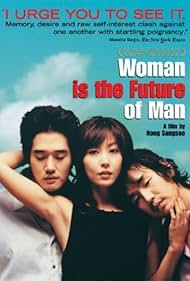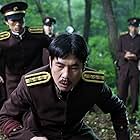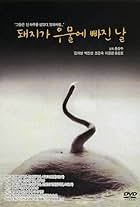IMDb रेटिंग
6.4/10
2 हज़ार
आपकी रेटिंग
अपनी भाषा में प्लॉट जोड़ेंTwo college friends get together and reminisce on the woman they both fell in love with at different times in their past, and are thus propelled to find her.Two college friends get together and reminisce on the woman they both fell in love with at different times in their past, and are thus propelled to find her.Two college friends get together and reminisce on the woman they both fell in love with at different times in their past, and are thus propelled to find her.
- पुरस्कार
- 2 नामांकन
फ़ोटो
कहानी
क्या आपको पता है
- ट्रिवियाOne of Martin Scorsese 's favourite films.
फीचर्ड रिव्यू
A story has a beginning, a middle, and an end: This comes from Aristotle, and it splendidly describes a great many stories from the European narrative tradition, but it doesn't describe all stories. It is very Western to stress the end, on where the story goes, the destination. It means progression or change in time, but when removing yourself to observe the composition of a story, what if interims and languid moments between characters, or one character, equipped it with its expression?
There are two basic kinds of good movies. One is a movie where you leave saying, "I don't under, wait, yeah, of course, now I understand! What a masterpiece! Let's go find a party," and by the time you wake up the next day, it is possible you are no longer thinking of it at all. Then, there is a movie that is upsetting or intricate or unusual, and you leave unsure, but you think about it the next day, or off and on for a week, or off and on forever. That is because that kind of film, which for instance aside from this film includes Nil By Mouth, No Country For Old Men, Brick, or any given John Cassavetes movie, is not clean or neat. There is something about it that comes purely from the heart, and so, it goes to the heart.
The story orbits droopily roundabouts two old pals, a university art teacher played by Yu Ji- Tae, who was the delightfully unusual villain in Oldboy, and Kim Tae-Boo playing a graduate from an American film school who has recently returned to his home country. As they have dinner in a restaurant, and Hong Sang-soo directs these two actors so that the painful awkwardness between them is realistically implacable, Tae-Boo talks Ji-Tae into fixing up a reunion between them and his old girlfriend, Seong Hyeon-ah. But, unbeknownst to Tae-Boo, Ji-Tae had grown to be drawn into a relationship with her following Tae-Boo's career-driven exodus to the US. Unlike the two men, she has no buried intention to compensate for or hold on to days gone by, not just for the reason that it's upsetting, but also because she is altogether here and now. The three shortly gather for a night of drinking, although ultimately, the film doesn't show any emotional culmination or yet still arrive at an apparent close. But that's your call when you see it.
The film was screened alongside another South Korean film, a magnificent one, Oldboy, at Cannes, marking the first time that two films from the country were in the competition simultaneously. Unlike Oldboy, Woman Is the Future of Man did not win any of the awards and reportedly met with an indifferent reception, which to me is strange. I don't find it to be a discouraging element to making the decision to see a movie, because that is a reaction that is highly unusual. It is not a sign that this is a bad film or that it's a profoundly brilliant film, because really it's neither. What it means to me is that it's from the mind of a filmmaker who is either ahead of the pack, or has gone on an entirely different path than the pack from the very beginning.
Perhaps it's the feeling of maudlin defeat that filters through this curious experiment in which reminiscence, longing and crude egotism clank versus each other with tenderness. Sang-soo has an unobtrusive, fragile technique and averts from theatrical accompaniments or dignified monologues. In fact the characters are quite ineloquent. There is a number of scenes of ungainly sex, perhaps because of a forlorn lack of communication. Really, whether Sang-soo intended the outcome to be this way, every viewer will have a different reaction. To me, though I was not blown away by the movie, I still had a lot of reaction to it, ultimately that Sang-soo's elegantly broken storytelling reflects that our reminiscences can bring not much solace.
There are two basic kinds of good movies. One is a movie where you leave saying, "I don't under, wait, yeah, of course, now I understand! What a masterpiece! Let's go find a party," and by the time you wake up the next day, it is possible you are no longer thinking of it at all. Then, there is a movie that is upsetting or intricate or unusual, and you leave unsure, but you think about it the next day, or off and on for a week, or off and on forever. That is because that kind of film, which for instance aside from this film includes Nil By Mouth, No Country For Old Men, Brick, or any given John Cassavetes movie, is not clean or neat. There is something about it that comes purely from the heart, and so, it goes to the heart.
The story orbits droopily roundabouts two old pals, a university art teacher played by Yu Ji- Tae, who was the delightfully unusual villain in Oldboy, and Kim Tae-Boo playing a graduate from an American film school who has recently returned to his home country. As they have dinner in a restaurant, and Hong Sang-soo directs these two actors so that the painful awkwardness between them is realistically implacable, Tae-Boo talks Ji-Tae into fixing up a reunion between them and his old girlfriend, Seong Hyeon-ah. But, unbeknownst to Tae-Boo, Ji-Tae had grown to be drawn into a relationship with her following Tae-Boo's career-driven exodus to the US. Unlike the two men, she has no buried intention to compensate for or hold on to days gone by, not just for the reason that it's upsetting, but also because she is altogether here and now. The three shortly gather for a night of drinking, although ultimately, the film doesn't show any emotional culmination or yet still arrive at an apparent close. But that's your call when you see it.
The film was screened alongside another South Korean film, a magnificent one, Oldboy, at Cannes, marking the first time that two films from the country were in the competition simultaneously. Unlike Oldboy, Woman Is the Future of Man did not win any of the awards and reportedly met with an indifferent reception, which to me is strange. I don't find it to be a discouraging element to making the decision to see a movie, because that is a reaction that is highly unusual. It is not a sign that this is a bad film or that it's a profoundly brilliant film, because really it's neither. What it means to me is that it's from the mind of a filmmaker who is either ahead of the pack, or has gone on an entirely different path than the pack from the very beginning.
Perhaps it's the feeling of maudlin defeat that filters through this curious experiment in which reminiscence, longing and crude egotism clank versus each other with tenderness. Sang-soo has an unobtrusive, fragile technique and averts from theatrical accompaniments or dignified monologues. In fact the characters are quite ineloquent. There is a number of scenes of ungainly sex, perhaps because of a forlorn lack of communication. Really, whether Sang-soo intended the outcome to be this way, every viewer will have a different reaction. To me, though I was not blown away by the movie, I still had a lot of reaction to it, ultimately that Sang-soo's elegantly broken storytelling reflects that our reminiscences can bring not much solace.
टॉप पसंद
रेटिंग देने के लिए साइन-इन करें और वैयक्तिकृत सुझावों के लिए वॉचलिस्ट करें
- How long is Woman Is the Future of Man?Alexa द्वारा संचालित
विवरण
- रिलीज़ की तारीख़
- कंट्री ऑफ़ ओरिजिन
- आधिकारिक साइट
- भाषा
- इस रूप में भी जाना जाता है
- Woman Is the Future of Man
- उत्पादन कंपनी
- IMDbPro पर और कंपनी क्रेडिट देखें
बॉक्स ऑफ़िस
- US और कनाडा में सकल
- $11,807
- US और कनाडा में पहले सप्ताह में कुल कमाई
- $4,763
- 5 मार्च 2006
- दुनिया भर में सकल
- $2,47,588
- चलने की अवधि1 घंटा 28 मिनट
- रंग
- ध्वनि मिश्रण
- पक्ष अनुपात
- 1.85 : 1
इस पेज में योगदान दें
किसी बदलाव का सुझाव दें या अनुपलब्ध कॉन्टेंट जोड़ें




















